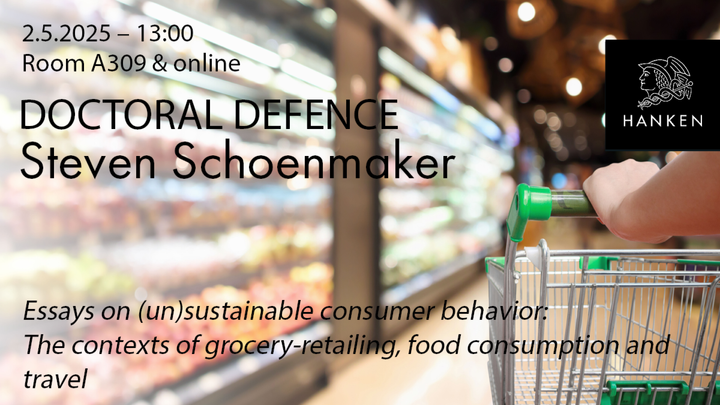New research suggests that current moral arguments to reduce meat consumption may actually backfire
The need to shift towards more sustainable dietary patterns by substituting animal products with plant-based alternatives is well-established. However, understanding which consumers are currently eating meat, who is willing to decrease their consumption, and why, remains a critical question.

In one study of his doctoral dissertation, Steven Schoenmaker investigated how the consumption of meat is associated with people's moral views and their motivation to reduce meat consumption. This study was carried out in collaboration with professors Jaakko Aspara and Per Kristensson.
Schoenmaker explains: “According to our study, individuals who endorse liberal values, such as caring for others, justice, and equality, are more motivated to reduce their meat consumption for health, environmental, and animal welfare reasons. However, despite being motivated, these consumers have not actually reduced their meat consumption.”
In contrast, Schoenmaker found that individuals who endorse conservative values, including loyalty to family or nation as well as the importance of respect for authority, are not simply unmotivated to reduce meat consumption for animal welfare or environmental reasons, but actively oppose it.
“This is an important finding since current campaigns to reduce meat consumption often emphasise environmental impact and animal welfare, which may not resonate with consumers who hold conservative moral views,” Schoenmaker comments.
Instead, he suggests that campaigns could be more effective if they focus on health benefits or highlight the degradation of a nation’s natural heritage caused by the pollution of lands and waters.
By tailoring the message to align with different moral perceptions, campaigns can better engage a broader audience and potentially achieve greater success in promoting sustainable dietary choices.
The full dissertation also covers insights on (un)sustainable consumer behaviour in grocery-retailing and the airline industry, and can be found here: Essays on (Un)sustainable Consumer Behavior : The Context of Grocery Retailing, Food Consumption and Travel
More information:
Steven Schoenmaker
E-mail: steven.schoenmaker@hanken.fi
Steven Schoenmaker will defend his thesis on the 2nd of May 2025 at 13:00 at Hanken School of Economics, Arkadiankatu 22, Helsinki.
The doctoral defence will be held in hybrid form. Participants can attend on site or via video conference. https://go.hanken.fi/defence-schoenmaker
Opponent: Professor Mikael Fogelholm, University of Helsinki
Custos: Professor Johanna Gummerus, Hanken School of Economics
Contacts
Marlene GünsbergSenior Communications Specialist
Tel:040 3521212marlene.gunsberg@hanken.fiAbout
Hanken School of Economics is a leading, internationally accredited university with over a hundred years of experience in education and research in economics and business administration. The research is of a high standard and constitutes the foundation of all teaching. Hanken has close ties to the business community and an active alumni network with over 16 000 alumni in 70 countries worldwide.
Alternative languages
Subscribe to releases from Svenska handelshögskolan
Subscribe to all the latest releases from Svenska handelshögskolan by registering your e-mail address below. You can unsubscribe at any time.
Latest releases from Svenska handelshögskolan
Juhana Vartiainen ny arbetslivsprofessor vid Hanken22.4.2025 10:00:00 EEST | Pressmeddelande
Helsingfors borgmästare, PD Juhana Vartiainen har utnämnts till arbetslivsprofessor vid Svenska handelshögskolan (Hanken). Han är knuten till institutionen för finansiell ekonomi och nationalekonomi för tiden 1.8.2025 – 31.7.2027.
Juhana Vartiainen Kauppakorkeakoulu Hankenin uusi työelämäprofessori22.4.2025 10:00:00 EEST | Tiedote
Helsingin pormestari, VTT, Juhana Vartiainen on nimitetty Kauppakorkeakoulu Hankenin työelämäprofessoriksi. Hän työskentelee rahoituksen ja taloustieteen laitoksella 1.8 2025 - 31.7 2027.
Juhana Vartiainen new Professor of Practice at Hanken22.4.2025 10:00:00 EEST | Press release
Mayor of Helsinki, PhD Juhana Vartiainen has been appointed Professor of Practice at Hanken School of Economics. He will be at the Department of Finance and Economics for the period 1 August 2025 - 31 July 2027.
Rekordantal vill studera på svenska på Hanken25.3.2025 17:57:44 EET | Pressmeddelande
I år har Svenska handelshögskolans (Hanken) kandidatutbildning både i Helsingfors och Vasa lockat rekordmånga ansökningar. Ansökningsmålen på både orterna slår alla tidigare års ansökningsrekord.
Ennätysmäärä hakijoita Kauppakorkeakoulu Hankeniin25.3.2025 17:57:44 EET | Tiedote
Tänä keväänä Kauppakorkeakoulu Hankenin kandidaattiohjelmaan sekä Helsingissä että Vaasassa on tullut ennätysmäärä hakemuksia. Hakukohteet molemmilla paikkakunnilla ylittävät kaikki aiempien vuosien hakuennätykset.
In our pressroom you can read all our latest releases, find our press contacts, images, documents and other relevant information about us.
Visit our pressroom